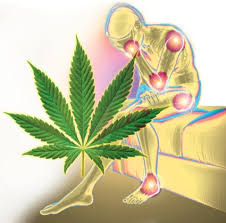

Chronic pain, an enduring and often debilitating condition, affects millions of people worldwide, destroying the quality of their life and limiting their daily activities. Finding effective and sustainable pain management solutions remains a big concern for both individuals suffering from chronic pain and the medical community all around the globe.
Many people around the world suffer from chronic pain, and live a life full of frustration and negativity. The problem of chronic pain has become a big challenge for both the individuals and doctors. Researchers are always looking for natural solutions to treat chronic pain, and recently cannabidiol (CBD) has become an option for helping with pain.
In this blog, we’ll explain in a simple way if eating CBD products, like gummies, can help with long-lasting chronic pain or not. We’ll talk about how CBD might change the way you feel pain, look at research that supports using CBD, and talk about important things like how much to take, safety, and the rules about CBD.
By the end of this article, you’ll know more about CBD edibles – Dopeboo and if they can help with long-lasting pain. This will help you make good choices about managing your pain.
Chronic pain is not just any kind of pain; it sticks around for a long time, often months or even years. This type of pain can be pretty tough to deal with because it doesn’t go away easily, and it can make your day-to-day life pretty hard. It’s like having a constant, unwanted companion that just won’t leave.
It can easily make your life from bad to worse. Think about all the things you love to do in your day-to-day life, like playing with your kids, going for a walk, or even just getting a good night’s sleep. Chronic pain can get in the way of all these things, making it really frustrating.
It’s not just the pain that’s difficult to handle; it’s also the impact it has on your life. Imagine having to miss work or school because the pain is too much to handle. Or not being able to enjoy your favorite hobbies or spend time with friends and family. Chronic pain can take all of that away, and it’s a problem that affects millions of people globally.
Cannabidiol aka CBD is a natural compound found in the cannabis plant, but it won’t make you high like some other parts of the plant can. In recent years, people have started wondering whether CBD might be a helpful option for managing chronic pain. Unlike its cousin, tetrahydrocannabinol (THC), CBD is non-psychoactive, which means it doesn’t produce the “high” or altered mental state typically associated with cannabis use.
CBD interacts with the body’s endocannabinoid system (ECS), which plays a role in regulating various physiological functions, including pain perception, mood, appetite, sleep, and immune response.
When it comes to finding relief from chronic pain, people often seek alternatives that are effective, easy to use, and have minimal side effects. This is where CBD edibles, like gummies or capsules, come into play as a potential solution. In this section, we’ll delve into the potential benefits of using CBD edibles for managing chronic pain, keeping things straightforward and easy to understand.
One of the advantages of using CBD edibles for chronic pain is their extended duration of action. When you consume a CBD edible, it has to pass through your digestive system before taking effect. This means the relief may last longer compared to other forms of CBD, such as inhalation or sublingual tinctures.
CBD edibles are as simple to consume as any other snack or supplement. There’s no need for complicated equipment or techniques. You can discreetly take them without drawing attention, making them a convenient choice for pain relief throughout the day.
CBD edibles typically come in pre-measured doses, which can help you maintain consistency in your pain management regimen. Knowing the exact dosage you’re consuming makes it easier to track your response and adjust as needed.
Unlike some other CBD products, such as vaping, CBD edibles do not require inhalation. This is important for individuals who prefer to avoid inhaling substances into their lungs, as it may be a concern for respiratory health.
CBD, when ingested as an edible, is distributed throughout the body via the bloodstream. This means it has the potential to provide relief not only at the site of pain but also throughout the body. This could be particularly beneficial for individuals with widespread or systematic chronic pain conditions.
In cases where chronic pain is the primary concern, individuals may prefer CBD edibles because they contain little to no THC, the psychoactive compound found in cannabis. This means you can potentially experience pain relief without the “high” associated with THC.
CBD edibles can be used in conjunction with other pain management strategies, such as physical therapy or prescribed medications. This flexibility allows individuals to explore a comprehensive approach to pain relief.
CBD edibles offer a range of advantages, including long-lasting relief, ease of consumption, precise dosing, and the potential for whole-body effects. Their ability to provide relief without the need for inhalation and the option of avoiding the psychoactive effects of THC make them an appealing choice for many individuals seeking pain management alternatives.
However, it’s crucial to acknowledge that the effectiveness of CBD edibles can vary among individuals, and results may not be instantaneous. Patience and consistency in usage are key when exploring their potential benefits.
Affiliate can only market to states where Novus MedPlan is licensed. Provider and Members can only sign up in states where Novus MedPlan is licensed. Any technical issues please contact info@getnovusnow.com Copyrights © 2024 Novus Acquisition & Dev. All rights reserved
